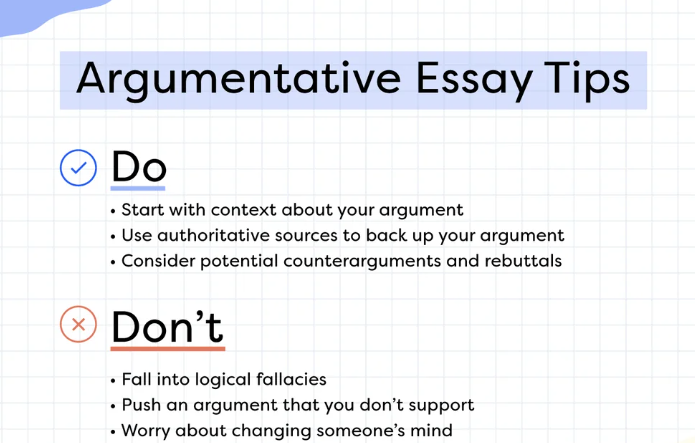An argumentative essay is a powerful tool in academic and persuasive writing. It allows you to present a well-structured argument on a particular topic, providing evidence and reasoning to convince your readers of your viewpoint. In this guide, we’ll explore how to write an argumentative essay step by step, offer some compelling topics for argumentative essays, and break down the essay structure for you.
Table of Contents
Steps on how to write an argumentative essay
Step 1: Choose a Controversial Topic
The first step in crafting an effective argumentative essay is to select a debatable and contentious topic. Consider issues with multiple perspectives and of genuine interest to you and your audience.
Step 2: Research Thoroughly
Once you’ve chosen your topic, it’s essential to gather credible and reliable sources of information. Consult books, articles, academic journals, and reputable websites. Take detailed notes and organize your research to support your argument.
Step 3: Develop a Clear Thesis Statement
Your thesis statement is the heart of your argumentative essay. It should be concise, arguable, and a roadmap for your essay. Here’s an example:
Thesis Statement: “Stricter gun control laws are necessary to reduce gun-related violence.”
Step 4: Outline Your Essay
A well-structured outline is your guide for writing an organized and compelling essay. We will discuss it in detail in our comprehensive guide.
Step 5: Write Your Essay
Now that you have your outline and research start writing your essay. Follow the structure and guidelines outlined in your outline, and ensure a smooth flow of ideas from one paragraph to the next.
Step 6: Revise and Proofread
Once you’ve completed your essay, revising and proofreading it carefully is crucial. Check for clarity, coherence, grammar, and spelling errors. Make sure that your essay effectively communicates your argument.
Step 7: Formatting and Citations
Format your essay according to the citation style required (APA, MLA, Chicago, etc.). Ensure that you properly cite all the sources used within your essay.
Step 8: Finalize Your Essay
Before submission, seek feedback from peers or instructors and make any necessary revisions. Double-check all aspects of your essay to ensure it’s polished and ready for presentation.
In conclusion, an argumentative essay involves meticulous planning, thorough research, and persuasive writing. Selecting a controversial topic, developing a clear thesis statement, and structuring your essay effectively are critical steps to crafting a compelling argument. With practice and attention to detail, you can become a skilled argumentative essay writer capable of presenting well-reasoned arguments that influence and persuade your readers.

Topics for argumentative essays
Creating an impactful, argumentative essay begins with carefully selecting a topic that ignites debate and elicits differing opinions. Opt for subjects that harbor a multitude of perspectives and that not only intrigue you but also captivate your target audience. Here are some thought-provoking topics that lend themselves to persuasive essays:
1. Climate Change and Environmental Concerns: Delve into the intricacies of climate change, human involvement, and potential resolutions.
2. Firearms Regulation: Engage in a balanced discussion about the merits and demerits of gun control measures, all while considering the sanctity of the Second Amendment.
3. Educational Reformation: Scrutinize the inadequacies of the prevailing educational system and proffer reforms for its enhancement.
4. Healthcare Policy: Scrutinize the various healthcare systems around the globe and contend for or against establishing universal healthcare.
5. Capital Punishment: Analyze the ethical, moral, and practical dimensions surrounding the death penalty practice.
6. Migration Dynamics: Delve into immigration policies, border security, and the far-reaching consequences on economies and societies.
7. Social Media and its Socio-cultural Impact: Investigate the repercussions of social media on mental well-being, privacy, and interpersonal relationships.
8. The Legalization of Marijuana: Present arguments in favor of or against the legalization of recreational or medicinal marijuana.
9. The Pursuit of Gender Equality: Delve into gender-based discrimination, the gender pay gap, and the role of feminism in achieving equality.
10. The Technological Invasion of Privacy: Examine the balance between technological advancements and individual privacy concerns.
30 additional sampled debatable topics for argumentative essays.
1. Climate change is primarily caused by human activity.
2. Vaccinations should be mandatory for all children.
3. Online learning is as effective as traditional classroom education.
4. The minimum wage should be increased.
5. Animal testing for scientific experiments is unethical.
6. The death penalty should be abolished worldwide.
7. Social media is making people less connected.
8. The United States should adopt a single-payer healthcare system.
9. Access to healthcare is a fundamental human right.
10. College education should be free for all students.
11. Technology is making us less productive.
12. Recreational marijuana use should be legalized.
13. Censorship on the internet is necessary to protect users.
14. The voting age should be lowered to 16.
15. Genetically modified organisms (GMOs) should not be used in food production.
16. Stricter gun control laws should be implemented in the United States.
17. There is a gender pay gap that needs to be addressed.
18. The government should regulate violent video games.
19. Homeschooling is a better educational option than public schooling.
20. Animal testing for cosmetic products should be banned.
21. Privacy invasion by government agencies threatens civil liberties.
22. The United States should adopt a universal basic income (UBI) system.
23. Companies should not track and use personal data for advertising.
24. The voting process should be made more accessible, such as through online voting.
25. The criminal justice system discriminates against certain racial or ethnic groups.
26. Schools should teach comprehensive sex education.
27. Space exploration is a worthwhile endeavor for humanity.
28. Professional athletes should be allowed to kneel during the national anthem.
29. Homeschooling is a more effective educational option than public schooling.
30. Fast food companies should be held responsible for the obesity epidemic.
These statements cover many contentious issues, making them suitable topics for argumentative essays. When choosing a topic, consider your interests and the potential for engaging your audience in a meaningful debate.
Comprehensive Argumentative Essay Structure
To meticulously craft a argumentative essay, it’s imperative to adhere to a comprehensive structural framework that ensures clarity and coherence. Here’s an elaborate outline for a persuasive essay:
Introduction:
– Commence with a captivating “Hook” that arouses the curiosity of your readers. This could be an intriguing fact, a probing question, or an anecdote closely linked to your subject.
– Offer essential “Background Information” on the chosen topic, illuminating its relevance and significance.
– Present a concise yet crystal-clear “Thesis Statement” that encapsulates your central argument and sets the course for your essay.
Example Introduction (for the topic “Gun Control”):
“In a nation deeply divided over personal liberty and public safety issues, the question of gun control stands as a contentious and critical debate. With escalating instances of gun-related violence, examining the merits of implementing stricter gun control laws in our society becomes imperative. This essay contends that stricter gun control laws are necessary to reduce gun-related violence and protect public safety.”
Body Paragraphs (usually 3-5):
– Typically, your essay will encompass three or more body paragraphs, each dedicated to elucidating a single point or argument that buttresses your thesis.
– Institute each paragraph with a lucid “Topic Sentence” that introduces the principal idea of that specific paragraph.
– Substantiate your claims with compelling “Supporting Evidence” comprising factual data, pertinent statistics, illustrative examples, or the wisdom of authoritative experts.
– Be sure to address “Counterarguments” that may arise and skillfully refute them by marshaling evidence and employing sound logic.
– Maintain “Transition Sentences” between paragraphs to sustain the seamless flow of ideas and ensure a continuous narrative.
Example Body Paragraph (for the topic “Gun Control”):
“One compelling reason to advocate for stricter gun control laws is the alarming rate of gun-related homicides in the United States. According to a recent study by [cite source], the U.S. experiences [statistics] gun-related deaths per year, which is significantly higher than [comparative statistics from other countries]. This evidence underscores the urgent need for more stringent regulations on firearm ownership and accessibility.”
Counterarguments and Rebuttal:
– Dedicate a distinct segment of your essay to the candid acknowledgment of opposing viewpoints. Subsequently, deftly rebuff these counterarguments by enlisting corroborative evidence and applying cogent reasoning.
– This practice serves the dual purpose of demonstrating that you’ve judiciously considered alternative perspectives while strengthening your argument’s veracity.
Conclusion:
– Revisit your “Thesis Statement” by encapsulating it in slightly divergent phraseology.
– Conduct a brief “Summary” of your essay’s primary arguments and briefly revisit each salient point.
– Reassert the “Significance” of your argument by elucidating its implications and real-world ramifications.
– Cap the conclusion with a compelling “Closing Statement” or instigate a “Call to Action” that compels readers to reflect or take affirmative measures.
Example Conclusion (for the topic “Gun Control”):
“Gun control is undeniably complex, involving personal freedom, public safety, and constitutional rights. However, the evidence overwhelmingly supports the need for stricter gun control laws to curb the epidemic of gun-related violence that plagues our nation. It is our collective responsibility to address this issue proactively, with an unwavering commitment to protecting the lives and well-being of our fellow citizens.”
By assiduously adhering to this detailed structure and aligning yourself with a captivating topic, you can master the art of crafting persuasive essays that deftly influence and enlighten your readers.

FREQUENTLY ASKED QUESTIONS
1. What is an argumentative essay?
An argumentative essay is a form of academic writing that presents a well-defined stance or perspective on a specific subject. It aims to persuade readers by providing solid evidence logical reasoning, and addressing opposing viewpoints.
2. What are the elements of an argumentative essay?
A clear and concise thesis statement is critical in an argumentative essay as it encompasses the introduction. These body sections offer supporting evidence and arguments, counterarguments with rebuttals, a conclusion that briefly summarizes the main points and reaffirms the thesis and the essential use of citations and references.
3. How do I choose a topic for an argumentative essay?
The process of topic selection for an argumentative essay involves discovering your interests and passions, researching prevalent issues or disputes within your field of interest, opting for a topic that invites multiple perspectives and discussions, ensuring your chosen topic carries relevance and significance for your intended audience, and assessing the availability of reliable sources and substantiating evidence for supporting your argument.
